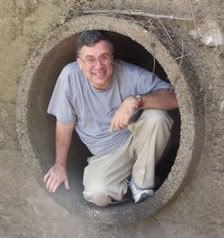Russian Refugees In Bet Shemesh
Dear Friends,
Have arrived in Kiev from Ben-Gurion Airport today after an eventful and rewarding week in Israel. Since last posting, I spent four days in Jerusalem, connecting with old friends and collecting material for stories for Jewish papers on how Arab-Jewish encounter groups have survived this turbulent period (with great difficulty, but Jews and Arabs in East and West Jerusalem--especially young people are still meeting and vowing to continue their friendships despite what is happening.) I also spent an hour with several hundred Russian-speaking refugees from the northern part of the country who are presently living in a school building in Bet Shemesh, a town of about 25,000 in the hills west of Jerusalem. They were driven from their homes in towns like Nahariya, Carmiel and Ma'alot by the relentless rocket barrage their and were invited to stay in Bet Shemesh for the interim. The town government of Bet Shemesh has provided the families with trips to Jerusalem, and nearby attractions like water parks and caves. The families live rent free and are provided with nourishing meals. The kids, who speak fluent Hebrew are thriving; several of them told me this is the berst vacation they ever had. The adults, many of whom have arrived in past 7 years and speak ponly minimal Hebrew have had a harder time. Despite all the kindness shown them by members of the Bet Shemesh municipality, and Russian-speaking volunteers from the community, they are going through a whole range of searing emotions. It is hard to sleep on mats on the floor for weeks at a time and to exist as refugees without privacy, No one knows when it will be safe to return home (no one believes the cease-fire will stick) or be able to work and make money again. Many are literally without any money left. Nearly everyone expressed great love for Israel and a committment to stay (although everyone seems to know some famlies who, in the past several weeks have boarded planes to Moscow and Kiev with the intention of moving back there), but they also expressed the feeling of being marginalized in Israeli society, of, as they put it, being treated worse than the Israeli Arabs, who they say, receive all kinds of social benefits, despite their hostility to the Israel state. When I asked a 12 year giirl what it had been like to endure a week in a shelter in Nahariya before her family fled south, she visibly shddered and said, "It was horrible. I was sure we were going to die and I was frightened to death. Now sometimnes I wake up in the middle of the night with nightmares that a rocket exploded on us and killed my whole family."
For me it was fascinating to see Russian Jews in the process of transforming into Israelis and comparing them to the many Russian Jews I know in the U.S. I see all the similarities and the common origin and yet somehow they are already a somewhat different species; they are grafting their lives onto a very different branch of world civilization--Israel and the Middle East as opposed to the polnay zapadnye reality of America. Yesterday, I had lunch with some Russians--consuming humus y salatim at a Mizrachi restaurant on the beach in Ashkelon, with plenty of shashlik etc, and talking to the kids in their sparkling Hebrew and it was a wonderful feeling that despite the trauma of the past month, they are thriving and immesaurably strengthening Israel.
Must run, as my time on the computer is up. I'll send some more reflections on my time in Israel and give you a report on Kiev and votpusk ve Krim in the days ahead,
Walter


0 Comments:
Post a Comment
<< Home